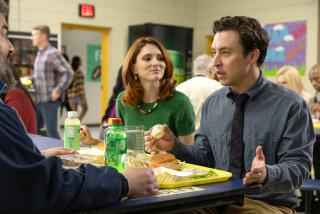Researcher Recalls Delight of Teaching
- Share via
I was setting up an experiment designed to fish out a single rat gene from a test tube full of rat genes when a group of teachers came by to see me one recent week. They were members of the science faculty at Coronado High School taking a tour of Salk Institute, and they had asked me to show them around the genetic engineering lab where I work.
It was the first time I had seen many of them since I left a teaching job in Coronado last June, and I was worried that they might not find laboratory life very interesting. But they asked a lot of questions about the rat-gene experiment and about the high-tech computer gadgets we use to analyze the strings of DNA we collect and piece together.
I was happy they enjoyed the tour--after all, I’ve worked as a research technician for more than 15 years, and I’m still fascinated by what goes on at Salk.
But fascination with DNA molecules hasn’t always been enough for me. Last year, at age 39, I left the lab and took a job as a high school biology teacher. I needed a change. I often tell people that working in a lab is like getting paid to play. Maybe I wanted more from a job than just play.
Or maybe I was trying to strike back at my high school biology teacher, who bored us with endless recitations of the names of phyla or frog muscles. We never had the kind of fun in class that real biologists do.
That class extinguished any interest I had in biology for years. In fact, I didn’t study science formally until after I graduated from college. If I could expose teen-agers to a little lab fun, some 15-year-old girl just might start her scientific career a little earlier than I did.
So I made the change. It was an exhilarating and exhausting year. For a beginner, I wasn’t a bad teacher. I had some great students. My highs were the highs of all teachers who love their jobs--the student I saw reading Jane Goodall’s “In the Shadow of Man” after we finished studying primates; the basketball star who “aced” a very difficult genetics problem; the French exchange student who gave me a scarf from Paris at the end of the year.
My happiest moment occurred during our study of DNA. I asked one class whether they could think of any useful purpose that mutations served. After a long silence and a few groans over what an unfair (i.e., not in the book) question it was, one of the brightest students raised his hand.
He said that, without mutations, we wouldn’t be here, that without mutations DNA would never change and organisms wouldn’t vary from one another and there would be no evolution. That was a moment I’ll never forget. What a thrill to see a student go beyond rote learning to formulate one of the fundamental concepts in biology.
It almost made all those Saturdays and Sundays spent writing lesson plans worthwhile.
I say almost because this fall I returned, not to teaching, but to lab work. Even now, I’m not sure why I chose to leave a job that I sometimes loved. Maybe it was because those times, those moments of student satori, were too infrequent. On many days, I fought unsuccessful battles with indifference--students would wear Walkman tape players or write notes to each other while I presented a lesson I had worked on all night.
Like all beginning teachers, I spent nearly every night and the better part of most weekends writing lessons and grading tests. Add to this the pressure of having to perform five periods a day, five days a week, and I found myself with an exhausting job. I wasn’t used to it.
In the lab, if I mess up an experiment, I can take the time to discuss it with a colleague or clear my head with a run on the beach. As a teacher, if I presented a lesson poorly in first period, I knew I was stuck on stage with my timing off until the 2:30 bell.
I also worried that what made me a good teacher was that I really wasn’t a teacher. I knew a lot of modern biology because I had worked in the field. I could explain gene therapy to students because I had done related experiments.
Once I begin to lose touch with what’s new in biology, biology might lose some its excitement for me. And then I’d end up some sort of second-generation version of my old bio teacher, boring my classes with outdated tales of genetic engineering and “biology like it was in my day.” So I left. And much of me is happy I did.
But when the Coronado teachers came by to visit, I began to face a fact I’ve been denying--that I regret not being a teacher anymore. I miss my students. Many of them went on to an advanced biology class this year, so I asked the teachers how they were doing.
Unfortunately, I learned that the student who discovered so much about mutations isn’t getting an A in the advanced class. I’ve been thinking about this kid all weekend.
But there’s nothing I can do about it now--I don’t teach there anymore. Future generations of biology students will survive and prosper without me. But as I sit at my lab bench playing with rat genes, I sometimes wonder how I’ll survive without them.
More to Read
Sign up for Essential California
The most important California stories and recommendations in your inbox every morning.
You may occasionally receive promotional content from the Los Angeles Times.













